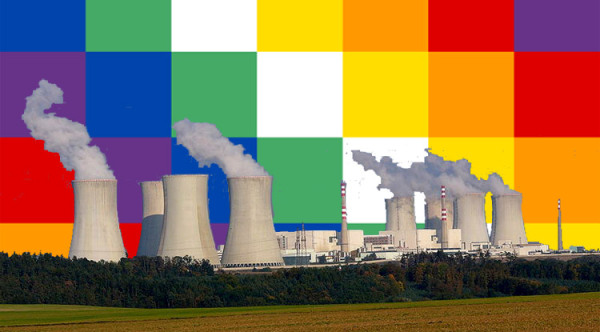“The best way of liberating ourselves is also having nuclear energy for peaceful purposes,” declared President Evo Morales of Bolivia on the 2nd of October in La Paz during his announcement that the highland area around the capital would be the home for a new nuclear industry.
Having been aware of the likelihood that Bolivia would try to enter the already dying nuclear age, international experts, organisations and activists had already sent a friendly letter to the President back in March explaining the dangers of the technology and pointing out the many contractions of a country so committed to the protection of “Mother Earth” developing the most toxic form of energy known to humanity.
Nevertheless this letter went unheeded and unresponded by the government and instead subsequent announcements have shown a determination to proceed in three directions: the building of a cyclotron for the production of radioactive elements that are used in medical procedures such as tomography which detects cancerous tumours; a research reactor and a nuclear power reactor. A total of 2 billion US dollars has been earmarked for the project.
These alarming developments are pushing civil society to respond and the first meetings and conferences have already been organised to try to raise awareness of the project among ordinary Bolivians: a public event was held on 6th of November in Cochabamba and a further event is planned on the 21st of November in Santa Cruz, basically to open a debate about the subject and to start the process of raising public awareness of the project.
According to Julio Lumbreras of the “Bolivian Club of Humanist Intentions”, involved in the organisation of the Cochabamba event, there are many grounds for concern.
“Regarding the production of electricity from nuclear energy, it clearly makes no sense as Bolivia already generates sufficient energy for her own needs meaning that the government must be interested in exporting energy to Argentina, Chile or Brazil, but currently 99% of the country’s hydroelectric potential is unexploited.
“We don’t have the scientific qualifications or technical training to develop such a project and it would take us 20 years to get to the stage of having adequately trained staff.
“Regarding uranium enrichment, it is not at all sure that Bolivia has sufficient reserves, apart from the fact that we don’t have the enrichment technology.
“It would be currently unconstitutional to move ahead with nuclear power as article 344 of the constitution expressly prohibits, ‘the internment, transport and storage of nuclear and toxic waste,’ anywhere on Bolivian territory.
“More worryingly, it is clear from our contacts in the anti-nuclear movement internationally that 2 billion US dollars will be nowhere near enough to build a nuclear power plant, maybe a research reactor could be built for that, but a more accurate sum would be between 8 to 10 billion US dollars.”
In addition to these concerns, academics point out the problem of the vast quantities of water required in maintaining a power plant and given that the proposed location is in a drought-prone region of the country, it hardly makes any sense to proceed.
The new anti-nuclear movement can already be found active on Facebook. The group “NO a La Energía Nuclear en Bolivia” has over 4200 likes and a lot of information is starting to circulate.
According to Lumbreras, “We are concerned by the lack of transparency in this project and the way the government propaganda machine is operating with the use of public funds for proselytising.
“We concluded in Cochabamba that we need to start a strong campaign to raise awareness and this should have three aspects: the social base, the world of academia and international.”
It seems that the process is already underway with a first forum to study and analyse the implications of nuclear energy in Bolivia to take place on the 17th of January 2015 near Cochabamba and to which anyone from Bolivia or abroad is invited to take part.
“We’re inviting everyone to come and help in forming the commissions and defining the proposals and initiatives that will allow us to hold a further, bigger forum in March,” concluded Lumbreras.










